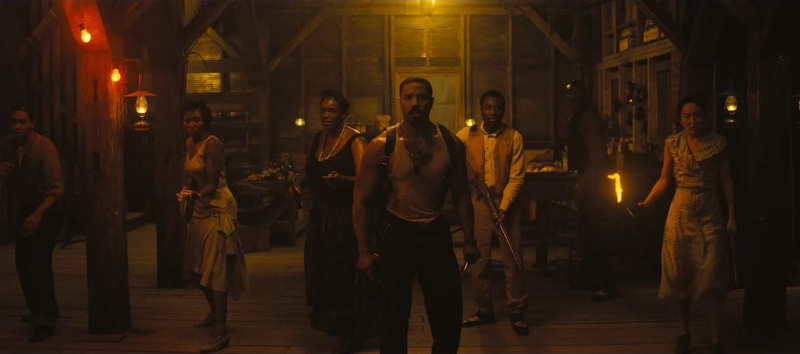Director – Ryan Coogler – 2025 – US – Cert. 15 – 138m
*****
In 1932, a young blues guitarist finds himself out of his depth when two brothers open a juke joint which comes unexpectedly under siege from supernatural forces – plays one night only, Sunday, March 1st, 6.30pm, as part of Film Tottenham following its release in UK cinemas on Friday, April 18th 2025
It’s a strange thing, but Warner Bros., which has a reputation for tough guy movies from its hard-edged gangster movies of the 1930s, has never made a movie about the blues. If that seems something of a stretch as an assumption, humour me here. The blues came out of the hardships of the Afro-American experience – white racism and the slave trade, poverty and hardship, and there was something raw about it, much as with those early gangster movies that shaped the Studio’s identity.
The idea of Warner Bros. making a movie about the black experience and the blues (or, indeed, building an entire genre around that idea) seems so obvious that it’s a wonder the Studio never did it before. Perhaps it’s significant that Warner Bros. were the Studio that made Elvis (Baz Luhrmann, 2023), which touches on such material.
Warner Bros. also has the first talking picture, The Jazz Singer (Alan Crosland, 1927), hardwired into its DNA. There may be aspects of that film, and of its white star Al Jolson playing in Blackface, that now seem disreputable or dubious; nevertheless Jolson’s appropriation of Afro-American music and Warner Bros.’ foregrounding it via the use of industry-changing, musical sequences with synchronised sound may well have played its part in the long process of black music breaking out into the wider cultural consciousness.
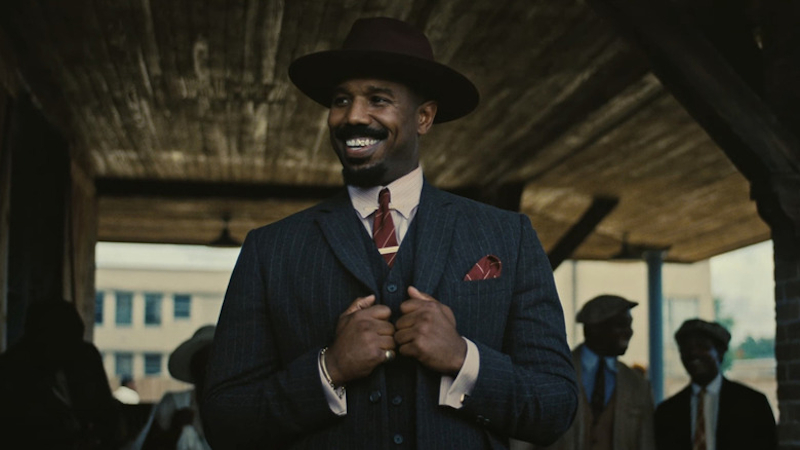
Which brings us to Sinners. Writer-director Ryan Coogler’s new film is many things. It’s most definitely a film about Black identity, although it throws in other ethnic minorities such as Chinese Americans and the Irish, and does a nice sideline in both Delta blues and Irish folk songs. The story of a pair of identical twins who decide to set up a juke joint in Clarksdale, Mississippi in 1932, it can certainly be filed under the tough guy / gangster movie moniker. The frankness of the tough guy genre extends out in further directions: there is a refreshing rawness in its approach to the blues, just as there is in its attitude to sex. The film delivers the latter – if you’ll pardon the expression – in sudden bursts, while white suprematism and its bedfellow the Ku Klux Klan are never far away, hovering around the fringes of the overall plot.
Other elements come into play too, most notably supernatural horror, an aspect about which the upfront publicity has been curiously coy. (And with good reason: as a critic, privileged to see this before anyone knew quite what it was, the specifics of the supernatural element come as a welcome surprise. Incidentally, the trailer below does a good job at dancing around that surprise, hinting at it but not actually giving anything away. We shall endeavour to do the same with this review, because not knowing exactly what’s coming and finding out the first time you watch is one of the many pleasures this film has to offer. For now, let’s just say that, among other things, this is a horror film, with well-wrought special effects including copious quantities of gore, but the wider story is such that it is skilfully and indeed quite brilliantly character driven, knowing exactly what it’s doing as it develops several fascinating and compelling plot lines that in and of themselves aren’t actually part of the horror to come).
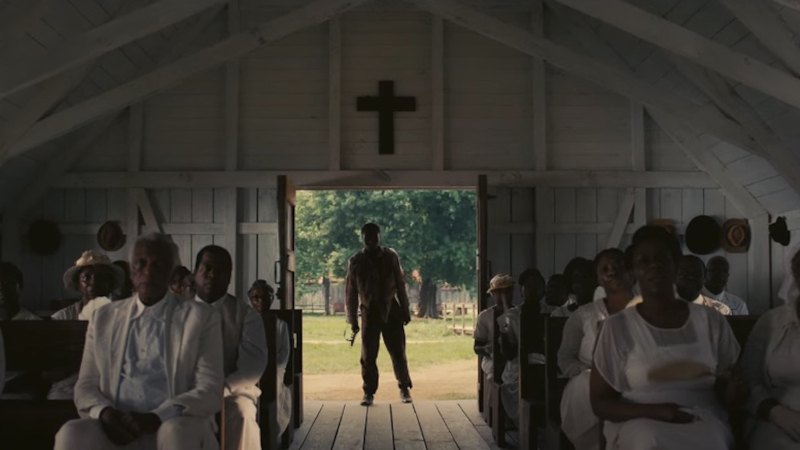
It opens with a young man named Sammie (Miles Caton, a star in the making), looking somewhat the worse for wear, parking his car then staggering into a church on the Southern cotton fields, severed guitar fretboard in hand, where he is confronted by his horrified preacher father and worshipping, Sunday morning congregation. His father warned him about the devil, but judging by the scars of Sammie’s face, he didn’t heed the warning. A flashback to 24 hours earlier tells us that this is going to be be one of those “how did we get ourselves into this current situation” films.
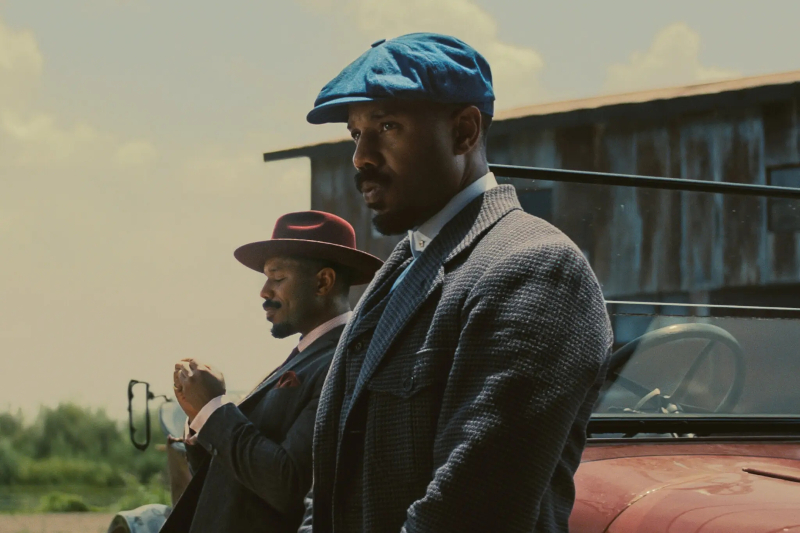
The short answer is, Sammie got involved with identical twin brothers Stack and Smoke (both played by Michael B. Jordan from Black Panther, 2018; Creed, 2015; Fruitvale Station, 2013, all Ryan Coogler) who have returned home from WW1 by way of gangland Chicago to set up their very own juke joint in Clarksdate, Mississippi. Stack is not the type to be messed with, hiring a naive local girl (Aadyn Encalarde) to honk his horn if anyone approaches his parked truck while he’s sorting out the supplies of drink with local Chinese shopkeeper Grace Chow (Li Jun Li from Babylon, Damien Chazelle, 2022) and shooting a potential thief in the kneecap after the girl’s horn alerts him.
The whole experience is rather like watching Killers of the Flower Moon (Martin Scorsese, 2023) made with its ethnic minorities not the whites as all its main protagonists, and then seeing that film suddenly and unexpectedly turn part-way through into an action horror movie not unlike Assault on Precinct 13 (John Carpenter, 1976, itself owing a great deal to Rio Bravo, Hoards Hawks, 1959) in which the protagonists are holed up in a building to which a ruthless street gang outside lay siege. Indeed, the switch from a drama about black people trying to get by and celebrate their culture is so sudden that it recalls nothing quite as much as *** SPOILER ALERT if you click on the link *** this celebrated genre-bender from 1996, which likewise starts off as a crime / gangster movie before suddenly shifting into a horror / action one.
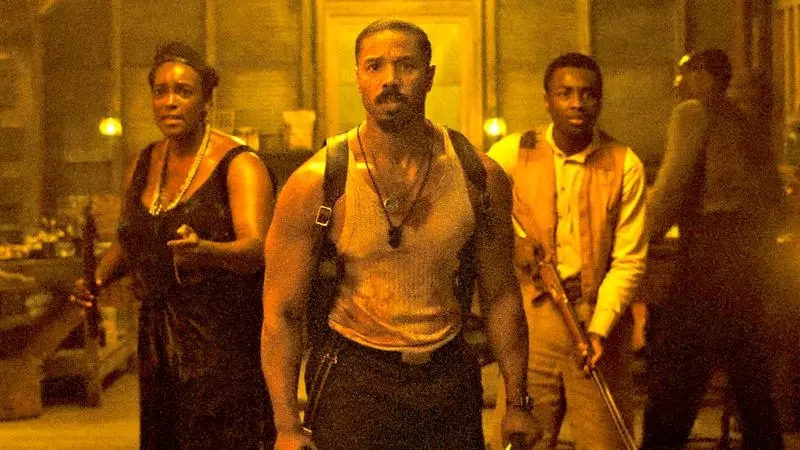
Audiences will likely respond enthusiastically to the move into horror / action territory, yet somehow it’s hard not to admire the first half more prior to its switch from the one thing to the other. The film is full of deft observations. The twins remove the tarpaulin covering various supplies intended for their proposed juke joint to uncover an unfriendly rattlesnake for a sequence which would be destined to stop you sleeping were it not so heavily upstaged later by the film’s second half.
Other memorable moments aren’t quite so dark. For Stack to meet Grace Chow, he must send her shop-counter-serving daughter Lisa (Helena Hu) out of one shop, across the street and into another, the camera following daughter walking out there and then the mother waling back in one deliriously understated unbroken take.
Somewhere at the core of the piece is the idea of a culture’s popular music expressing it at a very deep level. Nowhere is this better orchestrated than the sequence, before all hell breaks loose, of revellers jiving with a mixture of musicians and performers past and future, and from different ethnicities (Afro-American, African, Chinese) with the building burning down around them, its rafters on fire exposing them to the sky. This sequence could so easily not have worked, and you feel it ought not to work, yet, somehow, it does and it’s powerful and moving to watch: the undoubted high point of the movie.
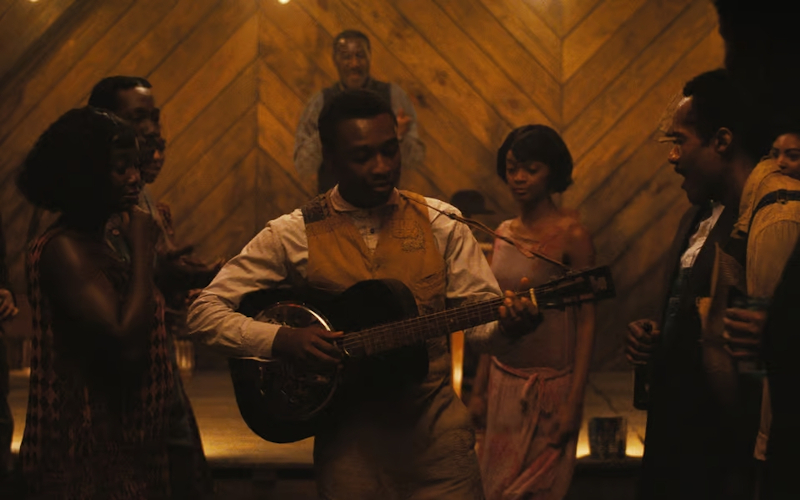
Much is made throughout of the Delta blues, with Sammie something of a fingerpicking, slide-playing guitar whizzkid, and veteran actor Delroy Lindo (from Da 5 Bloods, Spike Lee, 2020; A Life Less Ordinary, Danny Boyle, 1997; Broken Arrow, John Woo, 1996 and many more) thrown in as another musician, a hard-drinking piano player named Delta Slim who is down on his luck. One of a couple of scenes rolled out during the end credits features the veteran Sammie some six decades on, now played by veteran blues guitarist Buddy Guy.
Strong women characters include mysterious, married, white, juke joint party girl Mary (Hailee Steinfeld from Spider-man: Across the Spider-verse, Joachim Dos Santos, Kemp Powers, Justin K. Thompson, 2023; Bumblebee, Travis Knight, 2018; The Edge of Seventeen; Kelly Fremon Craig, 2017; When Marnie Was There, Hiromasa Yonebayashi, 2014), Hoodoo folk medicine practitioner Annie (Wunmi Mosaku) and married sex bomb Pearline (Jayme Lawson from The Penguin, TV Mini Series, 2024; The Batman, Matt Reeves, 2022; How to Blow Up a Pipeline, Daniel Goldhaber, Ariela Barer, Jordan Sjol, Daniel Garber, 2022; The Woman King, Gina Prince-Bythewood, 2022) whose name can be seen on the sign of the nightclub for the Buddy Guy sequence.
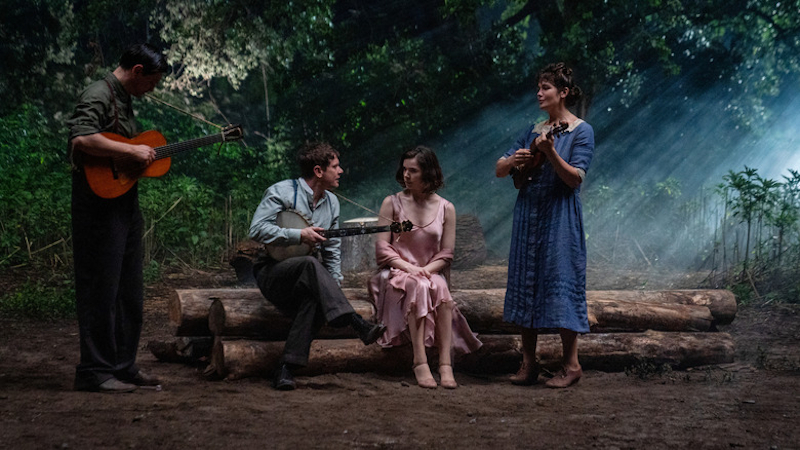
Notable male characters in the cast include Remmick (Jack O’Connell from ‘71, Yann Damange, 2014; Harry Brown, Daniel Barber, 2009; This is England, Shane Meadows, 2006), an Irishman given to playing and leading others in performing bleak Irish folk songs, Grace’s shopkeeper husband Bo (Yao), low life, door lookout man Cornbread (Omar Miller), and white businessman heavily involved in the local KKK chapter Hogwood (David Maldonado).
The way Coogler scripts then directs his way around complex, interweaving plot lines involving these various characters is nothing less than a joy to behold. From the opening frame story, and then in the flashback as one character after another is established, you feel you’re in good hands; Coogler knows what he’s doing, and never once lets you down.
While Fruitvale Station packed an undeniable punch, Coogler has come a long way since then, honing his craft on bigger budget Creed and Black Panther movies. Sinners is a very clever and arguably perfectly judged outing that knows exactly what it wants to do and how it wants to get there, with a light deftness of touch and a directorial ease. I must confess, going in, I had a mixture of low expectations before watching because this could so easily have been just another period drama about black people or, equally, just another gangster / horror movie falling back on familiar cliches. Yet it sidesteps both these potential traps to produce something far smarter. Once the film gets going, the results will have you on the edge of your seat. Meanwhile, the build-up to the point where this suddenly explodes into action is thoroughly engrossing. The whole thing is well worth two hours plus of your time.
Sinners plays one night only, Sunday, March 1st, 6.30pm, as part of Film Tottenham following its release in UK cinemas on Friday, April 18th 2025
Trailer:
